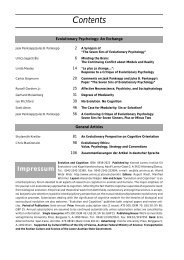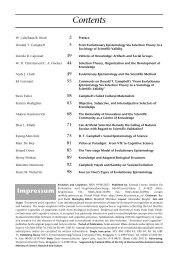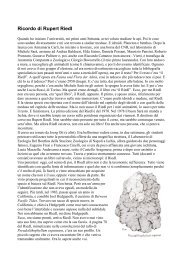Contents - Konrad Lorenz Institute
Contents - Konrad Lorenz Institute
Contents - Konrad Lorenz Institute
Create successful ePaper yourself
Turn your PDF publications into a flip-book with our unique Google optimized e-Paper software.
Some Perhaps Surprising Consequences of the Cognitive “Revolution”<br />
guage and communication is notable for the line in its<br />
preface remarking that “The bias is behavioristic—<br />
not fanatically behavioristic, but certainly tainted<br />
by a preference.” One of the first journals to routinely<br />
publish studies that followed in this line of research<br />
began life in the 1960s as the Journal of Verbal<br />
Learning and Verbal Behavior. By the 1980s the power<br />
of the revolution was felt, JVLVB disappeared and<br />
was reborn phoenix-like as Memory and Language—<br />
“learning” was gone, replaced by “memory,” “verbal”<br />
was gone, replaced by “language.” And, “behavior”<br />
was merely gone—no replacement needed.<br />
To get a feeling for how this cognitivist Zeitgeist<br />
functioned, it is instructive to look in some detail at<br />
a topic of investigation that first appeared during<br />
this period, implicit learning. Implicit learning is the<br />
process whereby knowledge is acquired largely independent<br />
of awareness of both the process and the<br />
products of learning (REBER 1993). Implicit learning<br />
takes place naturally when an individual attends to<br />
and works with a complexly structured stimulus domain.<br />
It typically results in the induction of a tacit<br />
knowledge base that captures many of the structural<br />
features of the displays. As a topic of investigation,<br />
it is one of the few that emerged early in the cognitive<br />
revolution that focused squarely on knowledge<br />
acquisition and, because its history overlaps almost<br />
perfectly with the shift from behaviorism to cognitivism,<br />
it makes for a relevant case study.<br />
A short “aside”on the subject of implicit learning<br />
The first reports appeared toward the end of 1960s<br />
(REBER 1967, 1969) just when the move away from<br />
behaviorism was going public. On the face of it, this<br />
was a topic that should have been embraced by the<br />
emerging cognitive revolution. It focused on learning,<br />
invited questions about the role of consciousness<br />
and had direct implications for developmental<br />
psychology, which was undergoing is own process<br />
of cognitivization. Moreover, implicit learning<br />
maintained links with behaviorism for, by its very<br />
nature, the process takes place without the blessings<br />
of awareness.<br />
No matter, the topic lay peacefully in the journal<br />
pages, virtually unnoticed and uncited for a surprisingly<br />
long time. It took nearly three decades on the<br />
fringes before it became, quite suddenly, an official<br />
“hot topic.” Just how “hot” is revealed by the results<br />
of the PsychINFO scan in Table 4. The number of<br />
publications on the topic jumped from single to triple<br />
digits from the 1970s to the 1990s. In addition<br />
to this hundred-fold increase in published papers,<br />
Decade<br />
Implicit<br />
learning<br />
Implicit<br />
memory<br />
1960–1969 2 0<br />
1970–1979 2 0<br />
1980–1989 21 55<br />
1990–1999 244 277<br />
2000–2009 399 914<br />
Table 4. The number of publications per decade on the topics<br />
of implicit learning and implicit memory based on a full-scan<br />
search. The figures for 2000–2009 are projections based on the<br />
assumption that the rate of publications for the early years of<br />
this decade will continue throughout it.<br />
three books were published in rapid succession<br />
(Berry/Dienes 1993; CLEEREMANS 1993; REBER 1993),<br />
two major journals (Psychonomic Bulletin & Review<br />
and Trends in Cognitive Sciences) featured it as a key<br />
topic of research, and in 1997 the “official” imprimatur<br />
was granted to the topic with the publication<br />
of the Handbook of implicit learning (Stadler/Frensch<br />
1997).<br />
This mushrooming of interest, however, was not<br />
driven by a sudden concern with mechanisms of acquisition,<br />
but by the discovery of the phenomenon<br />
of implicit memory. As Table 4 also shows, while this<br />
flurry of research on implicit learning was going on,<br />
the topic of implicit memory was undergoing a parallel<br />
growth. At first blush, this looks like a classic<br />
“chicken and egg” problem. Did the sudden interest<br />
in implicit memory drag along implicit learning or did<br />
the emerging attention to implicit learning pull<br />
along memory researchers For anyone who has<br />
worked in this area, the answer is unambiguous:<br />
learning rode in on the coattails of memory.<br />
Researchers who were interested in the unconscious<br />
acquisition of knowledge suddenly found<br />
their work in the spotlight, not because of any<br />
breakthroughs in research or any novel insight. The<br />
discovery 5 of the existence of memorial representations<br />
that had causal roles to play on behavior but<br />
remained outside the reach of awareness struck a<br />
chord among cognitive psychologists. Within a<br />
span of ten years, implicit memory went from a nontopic<br />
to being one of the most cited key terms in all<br />
of psychology. Note the pattern of publications in<br />
Table 4. The growth in interest in the role of the unconscious<br />
in acquisition only occurred when the<br />
topic of memory was recognized as having an implicit<br />
component (see SCHACTER 1987). While implicit<br />
learning “enjoyed” two decades of existence before<br />
implicit memory was even recognized as a topic,<br />
it was quickly surpassed by it. This asymmetry in interest<br />
is even more marked if one looks at the manner<br />
in which these two topics are handled in stan-<br />
Evolution and Cognition ❘ 109 ❘ 2003, Vol. 9, No. 2








